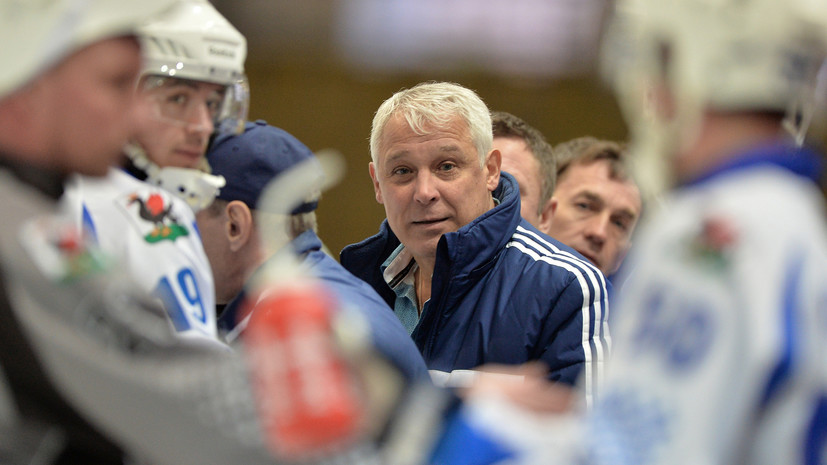The death of famed Russian coach Vladimir Yanko was announced on Monday by the Russian Bandy Federation.
“Today, May 16, in Moscow, at the age of 74, the most successful and titled specialist in domestic and world bandy, Honored Coach of the USSR Vladimir Yanko, died suddenly,” the statement said.
The FHMR expressed its deepest condolences to the relatives and friends of the deceased, saying that the farewell to Yanko would take place on Friday, May 20, in the building of the Central Clinical Hospital No. 1.
“This is the departure of an entire era and an irreparable loss for Russian hockey and all domestic sports,” the organization emphasized.
According to the president of the federation Boris Skrynnik, the probable cause of Yanko's death was the consequences of a coronavirus infection, which he had had about two months ago.
“There is no official conclusion from the doctors yet, because everything happened just a couple of hours ago.
But I can say that two months ago he suffered a coronavirus infection.
Of course, he also had chronic diseases, but, according to the doctors, he could still live and live with them, ”RIA Novosti quoted Skrynnik as saying.
He added that the federation will provide all necessary assistance to the family of the deceased.
“We will do everything we can.
A good person left, a good specialist, one of the best and leading coaches in the world, ”said the head of the FHMR.
Many victories in the history of Soviet and Russian bandy are associated with the name of Vladimir Yanko.
He was born in January 1949 in Moscow and, like all boys, played football in the summer and hockey in the winter.
“Then we spent days and nights at the stadium,” Yanko said in an interview.
He made his first serious steps in sports at the Dynamo children's school, and for a long time he played for both the football and hockey teams.
But at some point, the young athlete had to make a choice, and Janko settled on bandy.
As part of Dynamo Moscow, he became the champion of the USSR five times and won the European Champions Cup three times.
From 1973 to 1979 he played for the national team, in which he became the world champion four times.
At the age of 30, Yanko ended his playing career due to a knee injury that tormented him and almost immediately began working as a coach at a sports school in Kuntsevo, where he once took care of the boy himself.
And in 1981, he went to the World Championships in Khabarovsk in a rather unexpected role for himself as an expert of Soviet Sport.
During the tournament, the novice specialist met the chairman of the Trud society from Komi, who invited him to head the Syktyvkar Stroitel.
It was the first professional team in Yanko's career, which he managed to bring to the big leagues in five years of work.
After that, the coach moved to Krasnoyarsk, where in two seasons he won the USSR championship twice with Yenisei.
But the most successful period of club work was the years spent in Vodnik.
Under the leadership of Yanko, the team became the seven-time champion of Russia, won the Russian Cup three times, and two more times - the World Cup and European Champions.
As for the work in the national team, for the first time Janko headed the national team of the USSR in 1987, and two years later he led it to the gold medals of the World Championship, and then repeated this success.
With the Russian national team, he excelled in tournaments in 1999, 2001, 2006 and 2008.
Janko is the only coach in the world who has managed to win six World Cup titles.
Moreover, he called the medals of the world championships that he won in Sweden, both as a player and as a mentor, his most valuable awards.
“I was twice in the Nobel Hall, medals were awarded there.
Although it seemed to me that you can only receive an award in this hall once, ”Yanko recalled in an interview.
In recent years, he was chairman of the coaching council and a member of the FHMR executive committee.
The former mentor of the Russian national team, the Minister of Sports of Kuzbass, Sergei Myaus, called Yanko a great specialist and stressed that he would remember him as a cheerful and positive person.
“He had a sense of humor and responsibility.
He knew how to set up the guys, he could find an approach to each player ... When I got into the national team as a young coach, I mostly communicated with my own, with the Siberians, and Yanko immediately told me that if I want to grow up as a great coach, I need to communicate with great players.
They are difficult, but interesting.
I was also impressed that he always had a competent Russian speech, and even with a bad game, which rarely happened to him, he knew how to make a cheerful, good-natured face.
He never showed his emotions and experiences, ”Myaus shared his memories.

